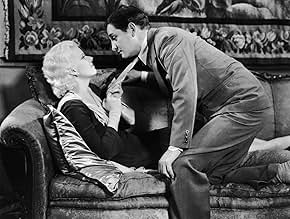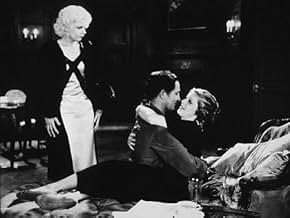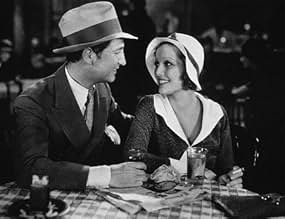Robert Williams(1894-1931)
- Actor
- Soundtrack
It's fair to say that if 'Frank Capra (I)' hadn't cast Robert "Bobby"
Williams in his 1931 film
Platinum Blonde (1931) the actor
would be entirely forgotten today. When the movie was made available on
video in the 1980s the promotional copy on the video box emphasized the
names most buffs would recognize: actresses
Jean Harlow and
Loretta Young, and director Capra himself.
But for many viewers there's no question about it, Williams steals the
show, with his low-key flair for comedy and unique, sleepy-eyed charm.
Viewers may well ask "Who is this guy, and why haven't I heard of him?"
The reason is simple, and sad: he died of peritonitis in 1931 just as
'Platinum Blonde (1931)_ went into wide release, just when he was on
the brink of stardom.
Born in 1897 in the vicinity of Morganton, North Carolina, he was raised on a farm. The acting bug bit early: he ran away from home at age 11 to join a tent show. He endured a long, hard apprenticeship as an actor, performing on Mississippi river boats and in stock companies touring the Midwest before he reached New York as a young man. When Williams made his Broadway debut in the early 1920s, the New York stage had entered its richest era, when hundreds of shows opened each season. Williams' stage credits include Eyes of Youth opposite Marjorie Rambeau, The Trial of Mary Dugan, Milgrim's Progress, Scarlet Pages, and Love, Honor and Betray with Alice Brady. Several of these plays were made into silent movies but Bobby was not cast in the film versions, perhaps because he was based in New York. His best remembered Broadway role was that of Abie in the original production of Abie's Irish Rose (1922), an ethnic comedy considered old fashioned even when it opened. Critics hated it, but the show became the biggest success of its era, running for five years.
When Abie's Irish Rose opened, Bobby was married to singer Marion Harris, a vaudeville and recording artist who was far better known than he. Perhaps her greater fame was a source of tension, but for whatever reason the marriage did not last long. The couple had one daughter, also named Marion, who later became a singer in her own right under the name Marion Harris Jr.
Even at the time of Williams' greatest Broadway success in Abie's Irish Rose, he seemed stalked by tragedy. Just a few days after the show opened, Bobby was driving from his home in Great Neck, Long Island, to the theater for a matinée performance. When he reached Corona, Queens, a 7 year-old boy named James Cali dashed into the street in front of his car. Williams was unable to stop or swerve, and the boy was knocked to the ground. The child died of a skull fracture hours later while Williams was held by the police for questioning. Character actor Wallace Ford, who had played the role of Abie during the show's pre-Broadway tour, stepped back into the role for the matinée and the next few performances while Williams recovered from shock. It appears that no charges were filed against him in the wake of the tragedy. Williams resumed the role of Abie but did not stay with the show much longer.
In the spring of 1924, Williams married actress Alice Lake, best known as leading lady in several film comedies made by 'Roscoe 'Fatty' Arbuckle' and Buster Keaton in the late 1910s. Once again, the marriage was brief. In February of 1925 the daily paper the New York Mirror detailed the couple's separation in an article with the headline: "Gay Life Parts Couple; Robert Williams, Juvenile Actor, Packs Trunk and Leaves His Wife, Alice Lake, Pal of Viola Dana ." Without directly stating that either Lake or Dana were gay or bisexual, the article strongly implied that their relationship went beyond friendship, and was responsible for the breakup of Lake's marriage to Williams. The following day the newspaper allowed Dana a rebuttal in which she denied being a home wrecker and said she knew nothing of the Williams' marital problems. In any event, the couple divorced soon afterward.
For the next several years Williams remained busy with stage work. He also married actress Nina Penn, and at last seemed to find marital stability. In 1930 Williams was cast in the Broadway production of Donald Ogden Stewart 's play Rebound which proved to be moderately successful, or at least successful enough to be purchased by RKO for filming. By this point the talkie revolution had hit Hollywood and the studios were snapping up plays, playwrights, and stage actors by the hundreds. Williams went to Hollywood and repeated his role of Johnnie Coles opposite Ina Claire in the film version of Rebound. In rapid succession he appeared in two other films for RKO, The Common Law (1931) opposite Constance Bennett, and Devotion (1931) with Ann Harding and Leslie Howard.
It was then that 'Frank Capra (I)' cast Bobby in Platinum Blonde (1931), for Columbia Pictures. Williams played down-to-earth reporter Stew Smith, who is drawn to socialite Anne Schuyler (Jean Harlow ) despite their obvious differences in background. Stew marries Anne while his fellow reporter Gallagher, a gal accepted in the city room as "one of the boys," waits patiently for Stew to recognize that his marriage was a mistake and that she is in love with him. The role of Gallagher was assigned, rather bizarrely, to the luminously beautiful Loretta Young, who was then 18 years old and would never be anyone's idea of "one of the boys." For that matter, Harlow wasn't all that believable as a haughty socialite either, but for Williams the role of Stew Smith fit like a glove. This was the sort of role that within a few years would become the province of actors like Spencer Tracy, James Cagney, and occasionally Clark Gable: the man's man with attitude, macho without being obnoxious about it, a guy who is good at his work but has a faint air of insolence about him. Williams pulls it off beautifully and effortlessly steals the show from his miscast co-stars. One wants to see more of his work.
Unfortunately, his work was at an end, for this star-making performance turned out to be Williams' swan song. Bobby was rehearsing with Constance Bennett for his next RKO picture, Lady with a Past (1932), when he complained of stomach pains. After a day or two the pain worsened, and despite his protests Williams was rushed to a hospital for an appendicitis operation. Before the operation was completed his appendix burst. Days later, on November 3, 1931, Williams died of peritonitis. He was only 37 years old. Platinum Blonde (1931) had been released just four days earlier, and the first reviews proclaimed Hollywood had a new star. Instead, Robert Williams became one of Hollywood's great might-have-beens.
Born in 1897 in the vicinity of Morganton, North Carolina, he was raised on a farm. The acting bug bit early: he ran away from home at age 11 to join a tent show. He endured a long, hard apprenticeship as an actor, performing on Mississippi river boats and in stock companies touring the Midwest before he reached New York as a young man. When Williams made his Broadway debut in the early 1920s, the New York stage had entered its richest era, when hundreds of shows opened each season. Williams' stage credits include Eyes of Youth opposite Marjorie Rambeau, The Trial of Mary Dugan, Milgrim's Progress, Scarlet Pages, and Love, Honor and Betray with Alice Brady. Several of these plays were made into silent movies but Bobby was not cast in the film versions, perhaps because he was based in New York. His best remembered Broadway role was that of Abie in the original production of Abie's Irish Rose (1922), an ethnic comedy considered old fashioned even when it opened. Critics hated it, but the show became the biggest success of its era, running for five years.
When Abie's Irish Rose opened, Bobby was married to singer Marion Harris, a vaudeville and recording artist who was far better known than he. Perhaps her greater fame was a source of tension, but for whatever reason the marriage did not last long. The couple had one daughter, also named Marion, who later became a singer in her own right under the name Marion Harris Jr.
Even at the time of Williams' greatest Broadway success in Abie's Irish Rose, he seemed stalked by tragedy. Just a few days after the show opened, Bobby was driving from his home in Great Neck, Long Island, to the theater for a matinée performance. When he reached Corona, Queens, a 7 year-old boy named James Cali dashed into the street in front of his car. Williams was unable to stop or swerve, and the boy was knocked to the ground. The child died of a skull fracture hours later while Williams was held by the police for questioning. Character actor Wallace Ford, who had played the role of Abie during the show's pre-Broadway tour, stepped back into the role for the matinée and the next few performances while Williams recovered from shock. It appears that no charges were filed against him in the wake of the tragedy. Williams resumed the role of Abie but did not stay with the show much longer.
In the spring of 1924, Williams married actress Alice Lake, best known as leading lady in several film comedies made by 'Roscoe 'Fatty' Arbuckle' and Buster Keaton in the late 1910s. Once again, the marriage was brief. In February of 1925 the daily paper the New York Mirror detailed the couple's separation in an article with the headline: "Gay Life Parts Couple; Robert Williams, Juvenile Actor, Packs Trunk and Leaves His Wife, Alice Lake, Pal of Viola Dana ." Without directly stating that either Lake or Dana were gay or bisexual, the article strongly implied that their relationship went beyond friendship, and was responsible for the breakup of Lake's marriage to Williams. The following day the newspaper allowed Dana a rebuttal in which she denied being a home wrecker and said she knew nothing of the Williams' marital problems. In any event, the couple divorced soon afterward.
For the next several years Williams remained busy with stage work. He also married actress Nina Penn, and at last seemed to find marital stability. In 1930 Williams was cast in the Broadway production of Donald Ogden Stewart 's play Rebound which proved to be moderately successful, or at least successful enough to be purchased by RKO for filming. By this point the talkie revolution had hit Hollywood and the studios were snapping up plays, playwrights, and stage actors by the hundreds. Williams went to Hollywood and repeated his role of Johnnie Coles opposite Ina Claire in the film version of Rebound. In rapid succession he appeared in two other films for RKO, The Common Law (1931) opposite Constance Bennett, and Devotion (1931) with Ann Harding and Leslie Howard.
It was then that 'Frank Capra (I)' cast Bobby in Platinum Blonde (1931), for Columbia Pictures. Williams played down-to-earth reporter Stew Smith, who is drawn to socialite Anne Schuyler (Jean Harlow ) despite their obvious differences in background. Stew marries Anne while his fellow reporter Gallagher, a gal accepted in the city room as "one of the boys," waits patiently for Stew to recognize that his marriage was a mistake and that she is in love with him. The role of Gallagher was assigned, rather bizarrely, to the luminously beautiful Loretta Young, who was then 18 years old and would never be anyone's idea of "one of the boys." For that matter, Harlow wasn't all that believable as a haughty socialite either, but for Williams the role of Stew Smith fit like a glove. This was the sort of role that within a few years would become the province of actors like Spencer Tracy, James Cagney, and occasionally Clark Gable: the man's man with attitude, macho without being obnoxious about it, a guy who is good at his work but has a faint air of insolence about him. Williams pulls it off beautifully and effortlessly steals the show from his miscast co-stars. One wants to see more of his work.
Unfortunately, his work was at an end, for this star-making performance turned out to be Williams' swan song. Bobby was rehearsing with Constance Bennett for his next RKO picture, Lady with a Past (1932), when he complained of stomach pains. After a day or two the pain worsened, and despite his protests Williams was rushed to a hospital for an appendicitis operation. Before the operation was completed his appendix burst. Days later, on November 3, 1931, Williams died of peritonitis. He was only 37 years old. Platinum Blonde (1931) had been released just four days earlier, and the first reviews proclaimed Hollywood had a new star. Instead, Robert Williams became one of Hollywood's great might-have-beens.












